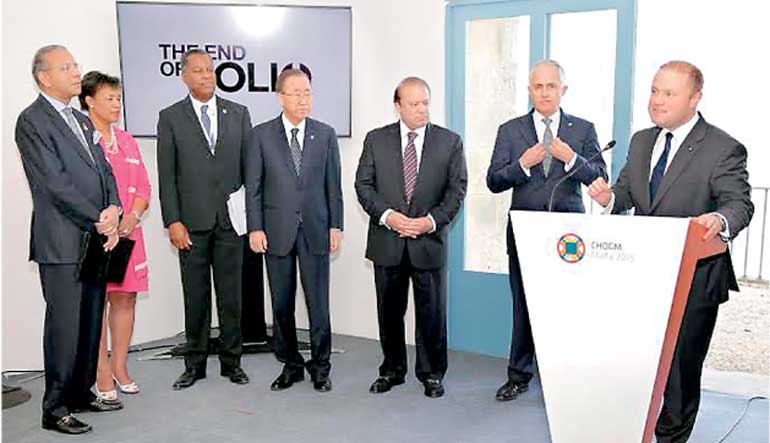Tuesday Feb 24, 2026
Tuesday Feb 24, 2026
Tuesday, 1 December 2015 00:44 - - {{hitsCtrl.values.hits}}
Representing civil society and partners of the Global Polio Eradication Initiative, Rotary International President K. R. Ravindran joined UN Secretary General Ban Ki-moon and Prime Ministers of Government of Australia, Nigeria and Pakistan and Foreign Ministers from Nigeria, Canada and Britain in a commitment to ending polio, a paralysing disease on the brink of global eradication. The event was hosted by Malta’s Prime Minister and CHOGM Chair Joseph Muscat. Muscat hosted the event to recognise collective progress and the need for continued global commitment. Leaders acknowledged the significant progress made since 2011, when Commonwealth leaders last met. India and all of Southeast Asia were certified free from polio in 2014. Earlier this year, Nigeria and Africa passed a year without a case of wild polio. Pakistan and Afghanistan are currently the only countries in the world with endemic polio virus transmission.

From left: Rotary International President K. R. Ravindran, newly elected Commonwealth Secretary-General Baroness Patricia Scotland, Nigeria’s Minister of Foreign Affairs Geoffrey Onyeama, UN Secretary General Ban Ki-moon, Pakistan Prime Minister Nawaz Sharif, Australia Prime Minister Malcolm Turnbull and Malta Prime Minister Joseph Muscat (speaking).
Ravindran recognised both the progress and need for continued focus, stating, “We are playing for stakes that are incredibly high, and our target is microscopically small. Until we find every last poliovirus, and vaccinate every last child, our immunisation, surveillance, monitoring, staffing, and infrastructure must be robustly maintained.” The Commonwealth’s work toward polio eradication is highly symbolic of the 2015 CHOGM’s theme of Adding Global Value, which aspired to leverage the strengths of the Commonwealth to make a substantive and demonstrable difference to the lives of people around the world.
An estimated $1.5 billion is needed to immunise children in countries which remain at risk for polio outbreaks, primarily in Asia and Sub-Saharan Africa. Leaders attending the summit announced continued political and financial commitment, including the release of € 45 million (£32 million) by the United Kingdom from a previous commitment for polio eradication activities. Ravindran welcomed the news of continued support noting that “Eliminating a disease completely is the ultimate in sustainable development: a limited investment that yields infinite returns.” Rotary made polio eradication its top philanthropic goal in 1985. As the volunteer arm of the Global Polio Eradication Initiative, Rotary has contributed more than €1.4 billion (US$1.5 billion) to ending polio. This includes more than €104 million (US$110 million) contributed by 300,000 members of Rotary clubs in Commonwealth member states. To date, more than 2.5 billion children have been immunised against the paralysing and sometimes deadly poliovirus.